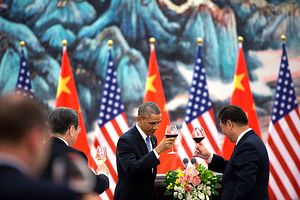The new executive order from the Obama administration significantly increases the stakes for Chinese and American firms. In the belief that private Chinese companies often benefit directly from industrial espionage (both state supported and privately conducted) against U.S. firms, the administration has determined that individual Chinese companies will be subject to financial and legal reprisal.
As several commentators have noted, the Chinese government may respond to this order by sanctioning U.S. firms working in China. This could dim the prospects of a wide swath of U.S. companies that depend on integration with the PRC, especially given that China has already evinced a willingness to respond to U.S. sanctions, and that U.S. companies face a tough environment with Chinese local government in the best of times.
But the Obama administration may be willing to take the risk of a hard stance on Chinese cyber-espionage. Industrial espionage isn’t the only, or even the most important, way for China to get technology from U.S. companies. Ever since China began attracting more FDI, Chinese companies have focused on the potential for technology transfer, which many Western firms have been happy to oblige. And despite the tremendous advances that the Chinese tech sector has made, technology transfers still flow much more heavily from the United States to China than the other way around.
On the one hand, the Obama administration simply wants to ensure that this technology transfer is above board, happening according to actual agreements between U.S. and Chinese firms. The White House is gambling that China understands that it needs U.S. tech firms more than U.S. tech firms need China, or than the United States needs technology transfer from China. The Obama administration is probably correct; Chinese industry still requires technology transfer from the United States, especially given the onerous demands and limited innovation capacity of China’s military-industrial complex.
And what if Obama just isn’t that worried about China curtailing technology transfer from U.S. firms? Voices from across the political spectrum in the United States have warned about the wisdom of ongoing technology transfer from U.S. to Chinese firms. Leftists worry about U.S. jobs, while conservatives express concerns about the national security implications of supplying China’s national innovation system with injections of new technology. The Obama administration has never demonstrated an overwhelming commitment to free trade, and it might see the prospect of Chinese counter-sanctions as an easy way to rein in the behavior of U.S. firms operating in the PRC.
In other words, the Obama administration gets to take a political stance that appears strongly in favor of the protection of U.S. business, with a secondary effect of limiting worrisome U.S. technology transfer to China. The administration isn’t bluffing; instead, it’s open to allowing the Chinese government to do its dirty work. Moreover, the two explanations aren’t entirely contradictory; lack of concern about Chinese response means that the United States can push harder to shifting technology transfer into legitimate channels.

































